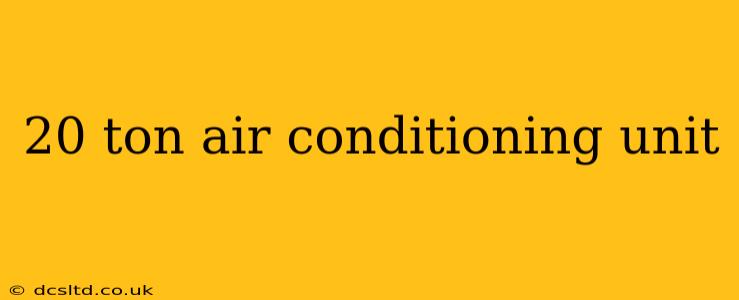20-Ton Air Conditioning Units: A Deep Dive into High-Capacity Cooling
Choosing the right air conditioning system is crucial, especially when dealing with large spaces requiring significant cooling power. A 20-ton air conditioning unit falls into the category of heavy-duty systems, ideal for industrial settings, large commercial buildings, or expansive residential properties. This article delves into the specifics of these powerful units, addressing common questions and concerns surrounding their operation, installation, and maintenance.
What is a 20-Ton Air Conditioner Used For?
A 20-ton AC unit is designed to cool extremely large areas. Think large warehouses, factories, expansive retail spaces, or even very large multi-family dwellings or commercial buildings. These systems are not suitable for typical residential homes, as their capacity would be significantly overkill. The precise application depends on factors like ceiling height, insulation, and the number of occupants or machinery generating heat.
How Much Space Does a 20-Ton AC Unit Cool?
There isn't a single definitive answer to how much space a 20-ton unit cools. The cooling capacity is dependent on numerous variables, including:
- Building construction: The type of insulation, window efficiency, and overall building design significantly impact cooling needs.
- Climate: Hotter climates necessitate more powerful cooling systems.
- Occupancy and equipment: The number of people, machinery, and other heat-generating sources within the space greatly influence the required cooling capacity.
- Ceiling height: Higher ceilings require more energy to cool the volume of air.
To determine the correct tonnage for your space, it's essential to consult with an HVAC professional who can perform a proper load calculation. This calculation considers all relevant factors to recommend the most appropriate and energy-efficient system.
What are the Different Types of 20-Ton Air Conditioning Units?
Several types of 20-ton AC units are available, each with its advantages and disadvantages:
- Packaged units: These self-contained units are typically placed on rooftops or outside the building. They are simpler to install than split systems.
- Split systems: These systems consist of an outdoor condensing unit and one or more indoor evaporator units. They offer greater flexibility in placement and often provide better zoning control.
- Chillers: Chillers are large refrigeration systems commonly used in very large commercial buildings. They use water or another refrigerant to cool the building.
How Much Does a 20-Ton AC Unit Cost?
The cost of a 20-ton air conditioning unit varies significantly depending on the type of system, brand, features, and installation costs. You can expect to pay tens of thousands of dollars for the unit itself, and installation can add a considerable amount to the total expense. It's advisable to obtain multiple quotes from reputable HVAC contractors to compare pricing and services.
How Much Does it Cost to Run a 20-Ton Air Conditioner?
The operational cost of a 20-ton AC unit will depend on factors such as electricity prices, the unit's energy efficiency rating (SEER), and the hours of operation. Because of their high capacity, these units consume a significant amount of electricity. Investing in a high SEER-rated unit can help mitigate these costs, as can practices like regular maintenance and proper insulation of the building.
What is the Maintenance for a 20-Ton AC Unit?
Proper maintenance is vital for the longevity and efficiency of any large air conditioning system. Regular maintenance for a 20-ton unit should include:
- Annual inspections: Professional inspections should check refrigerant levels, filter cleanliness, and overall system functionality.
- Coil cleaning: Keeping the evaporator and condenser coils clean is crucial for optimal heat transfer.
- Filter changes: Regularly replacing air filters prevents restricted airflow and improves efficiency.
Investing in a 20-ton air conditioning unit is a significant undertaking, demanding careful consideration of capacity, type, cost, and ongoing maintenance. Consulting with qualified HVAC professionals is crucial to ensure the right system is selected and installed correctly to meet your specific cooling needs efficiently and cost-effectively.
